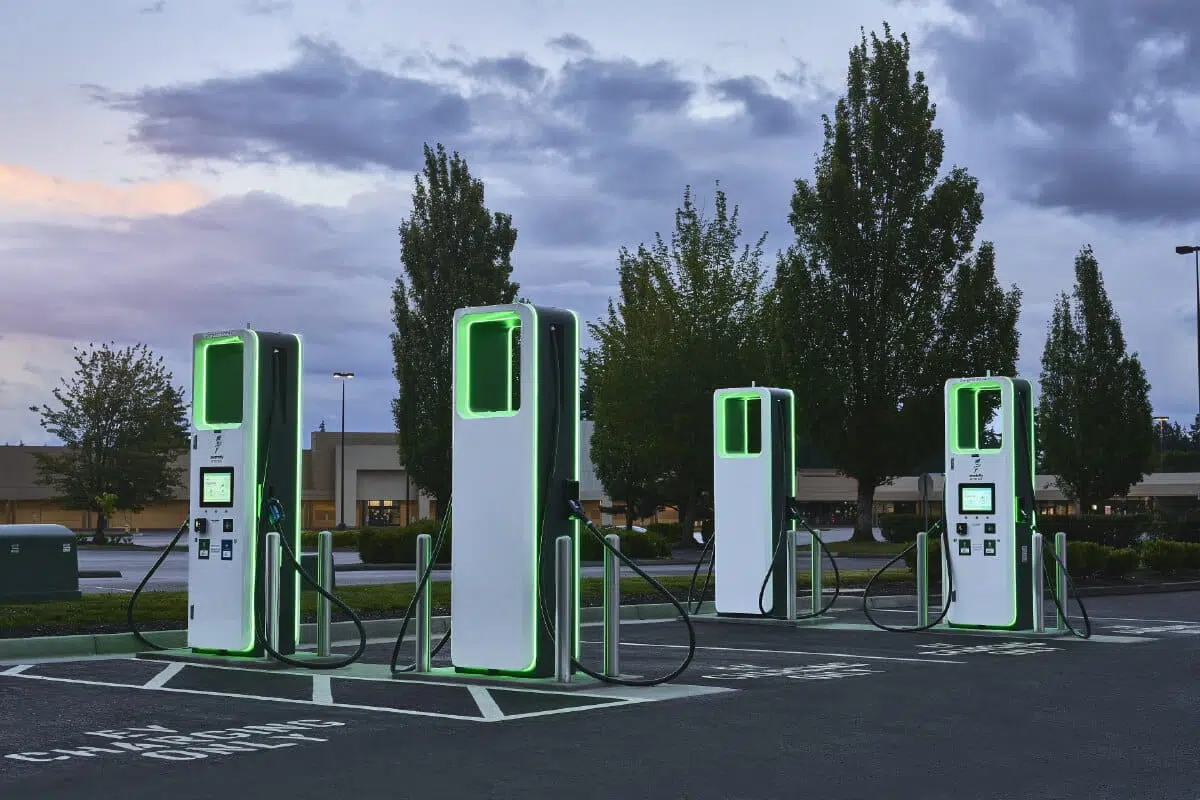- March 26, 2024
- Perspectives, Trending Topics
A Developer’s Guide to Electric Vehicle (EV) Charging


Jess Cain, PE
EV Practice Lead

Bryce Christensen, PE
EV Practice Lead

Ryan Gram, PE
EV Charging Implementation Lead

Jenna McDavid
ZEV Strategy & Planning Practice Lead
If you’re a commercial, residential, or industrial property developer considering electric vehicle (EV) charging stations at your sites, this is for you. In this guide, Kimley-Horn EV specialists share the benefits of adding EV charging to your sites as well as charging station options, quantity considerations, location factors, and funding resources for EV charging stations.
What's Inside a Developer's Guide to EV Charging?
Depending on the type of property you own and your target charging client, there are several benefits of installing EV chargers at retail, restaurant, residential, office, and other properties. Local, state, and federal incentives continue to promote the electrification of vehicles throughout the country. Consumers are becoming more environmentally conscious, causing them to switch to more eco-friendly, electric modes of transportation. Available charging stations are not only beneficial for consumers but also can drive more visitors to your site and increase their average on-site spend.
There are multiple incentives that can add up to help you bridge the financial gap caused by initial capital expenditures. This guide will help you understand who your riders are, and the current or projected need for EV charging options at your property, so you can better select a system that yields a return on your investment while creating a convenient charging location for those you serve.
Kimley-Horn is a proud leader in the design and implementation of EV charging stations throughout the country. With nearly a decade of EV experience, our experts have seen the benefits of EV charging and have compiled this guide to offer developers key points to consider. Our experts are here to help.
Download the Guide
About the Experts

Jess Cain, PE
A professional civil and environmental engineer with more than two decades of experience in renewable energy and telecommunications, Jess is an expert at developing creative design solutions for challenging sites. Jess has led a wide range of projects—from EV charging stations to 5MW-80MW ground-based solar projects to rooftop solar developments to battery storage systems—and she has extensive experience with EV chargers, microgrids, solar energy project development, procurement, construction, operations, and maintenance.

Bryce Christensen, PE
Bryce is a senior partner on multiple nationwide programs including national EV programs. He has worked on hundreds of EV charging station sites across the country—including parts of one of the first coast-to-coast EV charging routes. Bryce has a true passion for EV and a strong desire to see sensible infrastructure development and public education in this space. Bryce’s expertise includes EV charging station design, site planning and layout, grading and drainage design, erosion control, stormwater management system design, utility design, utility coordination, permitting, construction observation, pavement assessment and rehabilitation, parking assessments and planning, and site/stormwater inspections.

Ryan Gram, PE
Ryan specializes in implementing EV infrastructure in creative ways across the country. His EV experience began in 2014 as a project engineer for some of the earliest direct-current fast charging (DCFC) in the country. Since that time, Ryan has led teams across the U.S. and consulted on more than 3,000 EV projects in more than 40 states, positioning him as a leading authority and trusted advisor in the EV industry to public and private clients alike. Ryan is currently partnering on some of the most innovative EV programs in the nation and working with many developers and jurisdictions on the beginning of their EV implementation. He is leading teams across the firm and the U.S. to plan, design, permit, and install EV charging stations at a rapid pace to keep up with the ever-expanding EV industry. He has assisted clients with site selection and due diligence; EV charging station design, including civil, electrical, and structural management; EV readiness plans; fleet electrification; utility coordination; perm tting; construction phase services; evaluation of new technology and processes; and more.

Jenna McDavid
Jenna is highly experienced in clean energy and clean transportation. She specializes in delivering data-driven insights to support strategic decision-making. Her current and recent engagements focus on delivering expert advice regarding deployment of light-, medium-, and heavy-duty EVs and charging infrastructure as well as the policies and strategies to support these deployments. A recognized leader in the energy industry, Jenna serves as Vice President of the Board of Directors for the Association of Women in Water, Energy & Environment (AWWEE) and Treasurer of the Board of Directors for the International Energy Program Evaluation Conference (IEPEC). She served as Conference Chair for the 2019 IEPEC and has served as presenter or moderator for numerous conference sessions and webinars regarding zero-emission transit buses; charging infrastructure technologies and markets; and equitable siting of public charging infrastructure. Prior to joining Kimley-Horn, Jenna served two terms as Commissioner on Energy U e and Climate Change for the City of Somerville, MA, and as Expert Advisor to the California Public Utilities Commission (CPUC) on their Long-Term Energy Efficiency Strategic Plan process.
